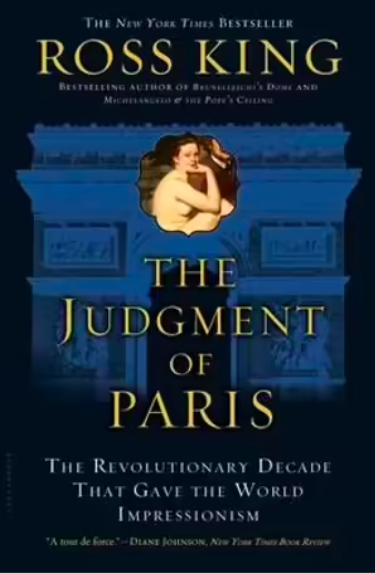Book Review: The Judgment of Paris by Ross King
This book is NOT about the 1976 Paris wine tasting where French wine was pitted against California wine. When to the astonishment of everyone in the wine world, California was the winner in both the red and white wine categories. Although that event was informally called the ‘Judgment of Paris’ in allusion to the ancient Greek myth.

Revolution in French art world—late 1800s
Ross King’s book is instead about the decade starting in 1863 and ending in 1873 about the revolution that took place in the art world, a seminal period when Paris was the artistic center of the world and the rivalry between Meissonier and Manet.
His story starts with the success of the wealthiest and most celebrated artist in 1863, Jean-Louis-Ernest Meissonier And it ends with the decline of Ernest Meissonier’s art career in 1873. And explains the revolution in the art world that took place in between those years.
The revolution in the art world was caused by artists insistent on following the art practiced by the:-
- Old Masters without deviation, known as L’École de Beaux Arts artists, and
- the new artists experimenting with new ways to see known as Les Impressionistes.
Artists that did not want art to look back in time, realistic, based solely upon historical figures or events. Artists started painting outdoors in Plein air rather than in a studio at an easel.
Impressionism insofar as they do not render the landscape itself, but the sensation produced by the landscape.
These artists were mostly those who frequented the Café de Batignolles wanted their paintings to reflect life as it was currently being lived. ‘The judgment’ was made annually as to which artists were accepted, and which artists were excluded (refused) from the Paris Salon exhibition, held at Palais des Champs-Èlysées. Artists like Manet, Monet, Pisarro, Cézanne, Renoir, and others became les refusés, their paintings, sculptures, and works of art were refused by the judges of the Salon.
These realists believed that their work: “was for those who think art in order to develop, needs more freedom from than that granted by the administration”. These were the pioneers of the future.
With a novelist’s skill and the insight of an historian, bestselling author Ross King recalls a seminal period when Paris was the artistic center of the world, and the rivalry between Meissonier and Manet.
Goodreads
The country itself was also engaged in wars during this decade between countries, governments, and leaders. Places included Mexico, in the Prussian-France war in the change of government in Austria. And at home between the Communards and the French bureaucratic government and agencies.
But this is not about those wars, it is about Art.
Perhaps Ernest Meissonier says it best when he says:
Time gives every human being his true value. The real worth of a man cannot be gauged until he is dead, until the clamor of friendship dies down over his ashes, until the farewell speeches, official or kindly, have been delivered. Then the edifice either crumbles away or endures in glory, flooded with light and flame.
A tale not just about art but about competing visions
This is a tale of many artists, it revolves around the lives of two, described as “the two poles of art”-Ernest Meissonier, the most famous and successful painter of the 19th century, hailed for his precision and devotion to history; and Edouard Manet, reviled in his time, who nonetheless heralded the most radical change in the history of art since the Renaissance.
The Judgment of Paris chronicles the dramatic decade between two famous exhibitions-the scandalous Salon des Refuses in 1863 and the first Impressionist showing in 1874-set against the rise and dramatic fall of Napoleon III and the Second Empire after the Franco-Prussian War.
Out of the fascinating story of their parallel lives, illuminated by their legendary supporters and critics—Zola, Delacroix, Courbet, Baudelaire, Whistler, Monet, Hugo, Degas, and many more—Ross King shows that their contest was not just about Art, it was about competing visions of a rapidly changing world.
The Judgment of Paris is an extremely interesting book for lovers of art and of history in the 19th century. I recommend it to all.
Are you a lover of Art and the Impressionists in particular? Have you read The Judgment of Paris? What are your views? Please share in the comments below.






